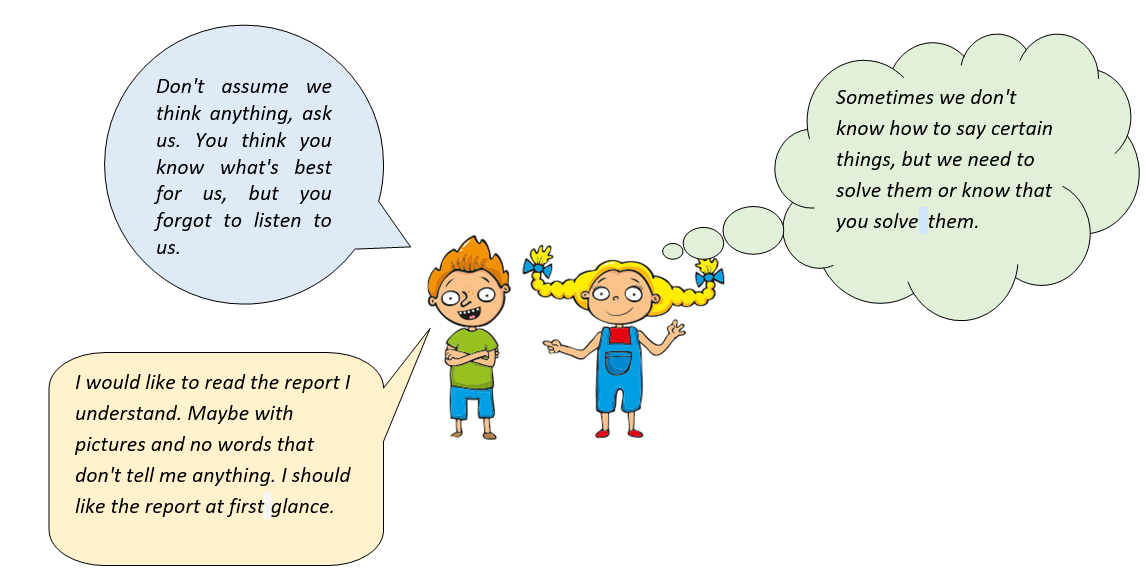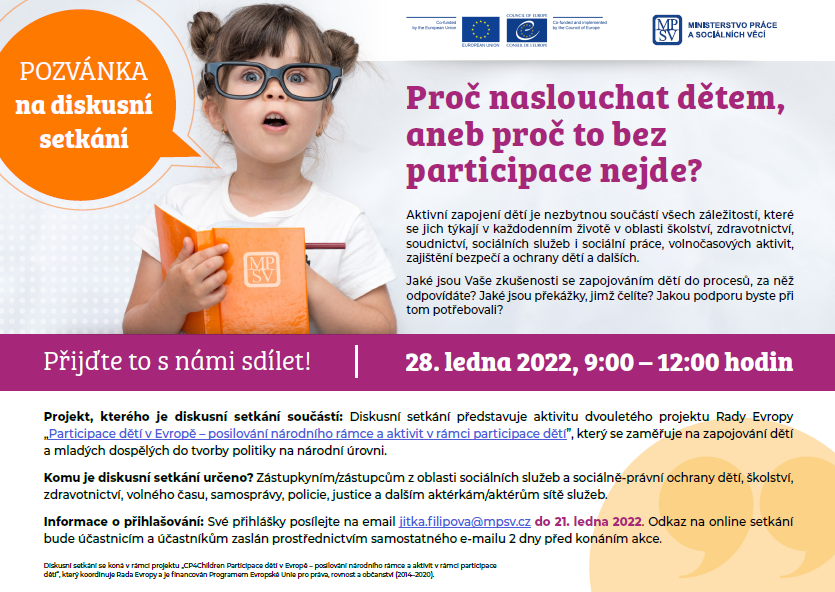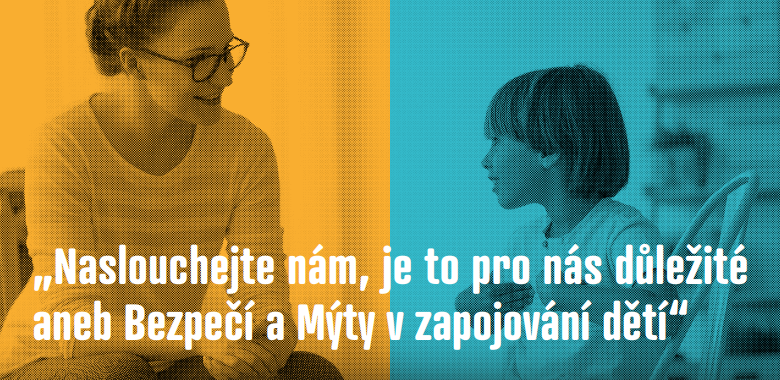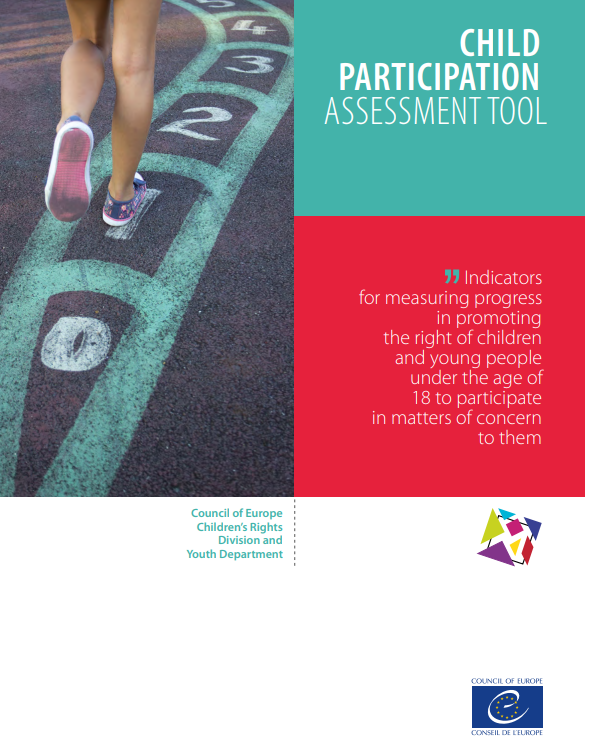Activities
Introductory webinar
On 2 November, a 2hour introductory webinar "Why listen to children, or why it's not possible without participation?" was held. The webinar aimed to present the key activities of the project, the Council of Europe's unique tool "Set of Indicators for Children's Participation (CPAT)" and the new methodology "Children's Participation" in national activities. It was attended by 80 experts from various ares: education, health, justice, social services, leisure activities and security forces.
The Ministry of Labour and Social Affairs is paving the way that listening to the opinion of children and young adults is the key for building their human dignity and healthy development. It tries to point out that children's participation should be perceived as a normal part of every activity, not as an exception. This idea was supported by the active involvement of children and a young adult in the practical part of the webinar. Through short videos, participants could see and hear how children, members of the drama club of the J. K. Tyl Theatre, discuss what law is and draw attention to what does not make sense to them at school, what they do not understand and what they would like to solve. Afterwards the experts discussed what children can do to change these situations and how the teacher can guide them through a difficult situation.
A young adult, a Member of self-advocates from the LUMOS organization had a dialogue with the Head of the Department of The Concept of Child Rights Protection and Transformation of Services for Families and Children from the Ministry of Labor and Social Affairs. They discussed involving children in public affairs. The young adult said that "everyone should have a right to express his or her opinion on topics that concern him/her. There should be no restrictions. It's not a question of whether the child wants it or can, but whether the adults will create a safe space for him/her." The young adult shared her own experience of what participation means to her, where she had the opportunity to express her opinions, where adults were listening to and what is not the correct way how to practice participation. "The city asked the children what the public space should look like. The children voted for a playground, and to this day, the place is still a parking lot. It will show the children that they have not been heard and they will lose the faith in their own voice, and in the city. This is not how participation is to be done".
At the webinar, good practice was shared by the project manager of the Fair School project, the Czech Professional Society for Inclusive Education (ČOSIV) and the psychologist of the Office for International Legal Protection of Children (ÚMPOD). The project manager of the Fair School project presented various forms of how children can be asked for their opinions. One of them was, for example, mapping the needs of children through a Lego kit. "When children are given the opportunity to express their opinion about school, and we adults respect their opinions, without evaluating it, children have the opportunity to participate in their education." Currently, ČOSIV is at the birth of the Children's Think-Tank, which is built on creative education and the ability to solve problems primarily by involving the children themselves.
Psychologist of ÚMPOD introduced new working procedures where there is a child in the center. On a case report of an international divorce dispute, she showed how important it is to invite children and let them express their opinion on how they would like and need to set up contact with their parents. "But we cannot forget that the involvement of children in matters that concern them is their right, not their duty. Adults need to be able to explain to them why it's important for them to get involved and what's going to happen to their opinion."
Both experts agreed that although involving children can sometimes be more difficult to prepare, especially for vulnerable children, participation cannot be neglected. "Not all children can say what they need. Some of them are affected by early developmental trauma and they themselves do not have a positive experience, not even a sense of security that they can say what they think. However, it is necessary to support them very sensitively in this and consider their situation."
And here is some feedback from participants:
"Participation is not new, but it seems as if it has only now come to the practice and reality of the activities of social workers."
"It was important for me to hear that participation is used at different levels and how."
The introductory webinar is part of the project "CP4Children Children's Participation in Europe – Strengthening the National Framework and Activities in Children's Participation", coordinated by the Council of Europe and funded by the European Union Program for Rights, Equality and Citizenship (2014-2020).
Children focus groups
„Participation is, when adults ask children how they feel, tell them ALL information, even the uncomfortable one, they simply explain. But I do not think the adults listen to children. THEY TAKE THEM MORE LIKE INFERIOR BEINGS, THEY OVERLOOK US.”
This is one of the opinions of children from focus groups which maps, whether, in what circumstances, in what kind of situation and in what forms, children have the opportunity to express their opinions.
The Ministry of Labour and Social Affairs team (MLSA) has already organized 5 meetings with approximately 60 children and adolescents from primary school in Prague, non-profit organization in Chrudim, school for chidren with special needs and for children from schoold parlaments. In full-time and distance form the team verified the fulfillment of indications of the unique tool CPAT for mapping children´s participation. Children focus groups are a key tool for determining the level of participation in various areas of the Czech Republic. The activity is the aim of the Council of Europe´s project “CP4Europe – Strengthening the National Child Participation Frameworks and Action in Europe.” The project focuses on involving children and adolescents in policy making at national level.
As focus groups have shown, older children knew that participation means involvement and some form of complicity. The children talked about the fact that they should be involved in all situations, namely at the doctor´ s, school, family, court. They felt the need to be involved in the crisis situations, which concern the whole society. They named e.g., that they did not have sufficient information about the COVID situation or the president health issue.
The MLSA team also mapped, if the children knew, that there is a statutory intuition protecting human rights.
THE CHILDREN DID NOT KNOW, THAT THE OFFICE OF THE OMBUDSMAN EXISTED AND DID NOT KNOW HIS/HER ROLE
Base on the video, the office was introduced to them. Children commented on whether and how they would use such an office. „Children should go to him/her if anyone restricts their rights.” „I would turn to him/her if I was unsecure about my rights.”
The children were subsequently informed that there was no Office of the Children´s Ombudsman in the Czech Republic.
THE CHILDREN UNIQUELY OPINED THAT THEY WOULD APPRECIATE ITS EXISTENCE
„Although I would not use him/her, it is a good thing other children can use his/her service, the ones who need it.“ „I would use him/her, but I would need to know in which circumstances I can turn to him/her.“
The team also addressed them of complaints and the mechanisms for complaining and being heard. It was clear from the children´s reactions that the issue of complaints in the school environment was important to them. However, the children felt that they lack a clear complaint mechanism. „An anonymous complaint box would help us, and the messages would not to be read in front of everyone. But it is important that we know that our complaints are being resolved.“
The children also gave examples where it would be appropriate to complain about a social worker, a police officer or a judge. „For example, if she treated us unkindly, made us say something that was not true I could complain. Or if a policeman threatened us, he would be mean to us, forcing us to say something, even if we did not want to.“
THE CHILDREN SAID THAT THEY WERE AFFECTED BY THE POLICEMEN WHO LOOKED VERY SERIOUS
The children also had the task to answer who to turn to if they were hurt, what their ideas were about the competencies of police officers, judges, and social workers, and what their personal experiences were with them. The most common experiences were that they spoke to a police officer when they were witnesses some events (theft, finding a lost friend) or during a discussion at school.
The team also mapped, if and how children learned about the outcome of the decision in court (divorce) proceedings, how they felt in communication and what they would recommend changing the communication.
„I WOULD LIKE TO READ THE MESSAGE I UNDERSTAND. FOR EXAMPLE, WITH PICTURES AND WITHOUT WORDS THAT SAY NOTHING TO ME. I WOULD LIKE THE REPORT AT A GLANCE.“
THE CHILDREN STATED THAT THEY DID NOT WANT TO SPEAK TO THE COURT
They cited their uncertainty as the reason. Stress can cause them to say something that is not true and then pay for it. It has become easier for them to talk to a social worker, even if they do not feel comfortable either „I felt weird, I was afraid that if I said something she would say to the court instead of me and I wanted it differently, I would no longer be able to influence it. Or she will not even tell the court and I will not know it. “
And what would children want to tell the adults? „Do not assume we think anything, ask us. You think you know what the best for us is, but you forgot to listen to us. Talk to us and explain things, to us clearly. “
Expert focus groups
„As the experts, we already know that participation is YES. But the question remains how to motivate all people working with children to be able to involve children in their daily practice so that it fits the children.”
This is one of the opinions of experts from the focus group, which maps whether, under what circumstances, in what situations and in what forms adults working with children have mechanisms in place for their involvement.
The team of the Ministry of Labour and Social Affairs (MoLSA) organized an online meeting of 42 professionals, where they verified the fulfillment of the indicators of the unique CPAT tool for mapping children's participation. In addition to a focus group of children, a focus group of experts is a key tool for determining the level of participation of children in various areas of life and processes.
The activity is a part of the Council of Europe's project "Children's Participation in Europe - Strengthening the National Framework and Children's Participation Activities", which focuses on the involvement of children and adolescents and on the development of participatory policy at the national level.
During the meeting, the MoLSA team introduced a group of young self-advocates and their conception of participation through a video prepared by LUMOS organisation. In the form of short quotes, the MoLSA team also shared findings from earlier focus groups of children on the topic of their involvement, and experts were given their most important messages.

Through discussions with experts, the MoLSA team found out whether, according to their experience, children are informed about their right to participate, whether they understand it and by whom they are or should be informed about their right to participate. Experts agreed that children must be actively informed about their right to participate, they must have the opportunity to experience participation in everyday situations. "Children need to be able to decide on pleasant things first, then they will not be afraid to decide on the unpleasant ones." Children need to receive information that are consistent and in a way that they understand. The most important thing is that participation is a right, not an obligation.
SOMETIMES A WELL-INFORMED CHILD LEAVES A MEETING, EVEN IF WE LEARNT NOTHING. AND IT IS ALSO OK. IT IS ALWAYS NECESSARY TO HAVE TIME FOR THE PARTICIPATION.
The MoLSA team, together with experts, sought an answer to the question: "What are the mechanisms for the safe exercise of children's right to participate in administrative or judicial proceedings?" Familiarization with this right occurs only when they find themselves in a difficult situation for them, such as parental separation, school problems or relationships.
CHILDREN ARE SOMETIMES SURPRISED THAT THEY HAVE SOME RIGHTS IN DIFFERENT PROCEEDINGS.
The team also addressed the area of complaints and the mechanisms for complaining and being heard. Experts named that children have the opportunity to provide feedback on the service / activity in which they are involved, by a variety of options (interview, online questionnaire for complaints, emotional cards, questionnaires, in writing). Experience has shown that not all selected tools are suitable for children. It is important to adapt the form to the age and mental abilities of the children. At the same time, children need to feel that it is safe to communicate their views. It is advisable to take into account that the child will evaluate the proceedings and the process after its completion and set the possibility of feedback with the passage of time.
IT IS IMPORTANT THAT CHILDREN KNOW WHY THEY COMMUNICATE FEEDBACK AND WHAT WILL HAPPEN TO IT.
The MoLSA team was looking for answers to the question of whether there should be an independent institution controlling exclusively children's rights and what / whom should it control? “It is important that there is an independent institution in the Czech Republic that protects children's rights. But it is more important that children understand this and are not afraid to turn to it." At the same time, the experts pointed out that "there are already institutions in the Czech Republic that have the rights to protect children - social services, social and legal protection bodies for children, the Public Defender of Rights and others". If a new function were to be introduced, it would be good at first clearly define how and who should deal with children's rights, so that it is clear what an independent institution can control.
IT IS IMPORTANT THAT CHILDREN KNOW WHO THE CHILD OMBUDSMAN OR OMBUDSWOMAN IS AND WILL NOT BE AFRAID TO CONTACT THIS INSTITUTIONS.
The experts mentioned that they perceived sufficient support in the legislation for involving children in decisions that affect them. However, they said that legally it could be described, but the question is whether we work with it as adults.
IT IS NEEDED TO BE SENSITIVE TO THE LEVEL OF CHILDREN´S INVOLVEMENT IN DIFFERENCT PROCEEDINGS, BECAUSE IT CAN BE VERY DEMANDING FOR CHILDREN.
Experts have agreed that the topic of participation has changed over the last 10 years and there is currently a wealth of materials available on the topic of participation.
PARTICIPATION NEEDS TO BE TALKED AND SHARED AMONG COLLEAGUES AND EXPERTS FROM OTHER SECTORS WORKING FOR AND WITH CHILDREN.
And what would adults say to children?
"If you can't confide in anyone you know, you can confide in someone you don't know. An anonymous Safety Line, for example. "
"In order for the judge to decide in your best interests, he should know not only your opinion, but also more things about you, how you perceive your parents and the situation at home. But it's up to you to take advantage of it. "
"We parents love you, we learn that."
Invitation

Conference for and with children

On 23rd February 2023 the conference: „Listen to us, it is very important for us. Safety and Myths in the child participation “ was taking place in Ecological center. 21 children met 45 professionals working with and for children to share their experience with child participation.
The Ministry of Labour and Social Affairs is one of the key partner to the CP4Children run by the Council of Europe. The main goals of the conference supported the key activity of the project CP4Europe – Strengthening National Child Participation Frameworks and Action in Europe.
The unique tool "Set of Indicators for Children's Participation (CPAT)" and the new methodology "Children's Participation" were introduced to all participants. We talked about Safety when including children, talked about Myths which are present in our society and often shape our approaches towards children and together search principles in the communication among adults and children.
Here you will find a short report to introduce our approach.



